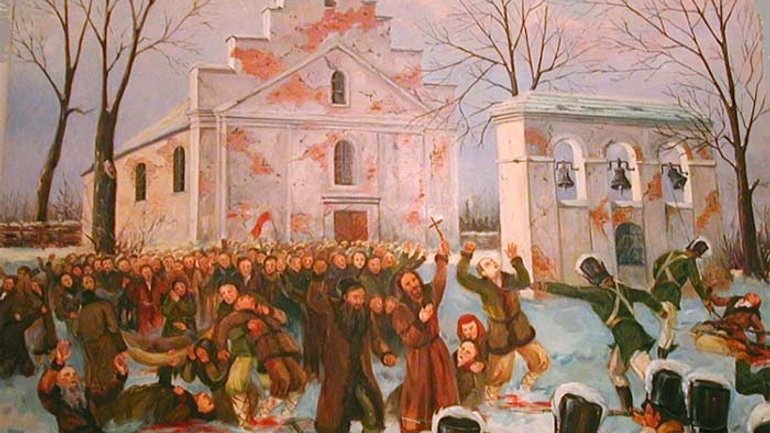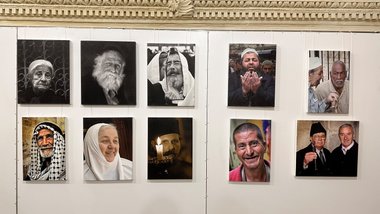Bleeding Wound in a Political Heart

The Maidan revolution of dignity was supported by all Churches and religious groups of Ukraine. It was opposed by the Kremlin and its allies. In a recent article for First Things, Ukrainian Orthodox (Moscow Patriarchate) Archimandrite Cyril Hovorun identified the Ukrainian Greek-Catholic Church (UGCC) as a prominent and visible moral support to the justice movement. For this, the UGCC earned the ire of Putin and his cohorts. In January, the Russian strongman revealed his hand when, at a press conference in Paris, he lamented what he claimed had been agitation by "clergy from Western Ukraine" (read UGCC). Since that time, the rhetoric of the Russian state Church has taken on an increasingly hostile tone toward the UGCC (whom it continues to label "Uniate," an historical term which, already in the 18th century, had strong pejorative overtones), as well as to other religious groups in Ukraine. Such was the tone of a message by the Patriarch of Moscow, a close ally of Putin in his allegedly 'conservative,' anti-western crusade.
The Moscow Patriarchate's chief of external affairs, Metropolitan Hilarion, a protégé of Kirill, has been consistent with Putin's anti-Ukrainian politik and its strong dose of anti-Catholic rhetoric. His statements resulted in him being banned from entering Ukraine, for a time, as persona non grata. For the past several years, Hilarion has attempted to smear Ukrainian Greek-Catholics in the eyes of, in his words, his "contacts in Rome." At the same time, the prelate has remained silent when asked, by the Apostolic See of Rome, to substantiate such claims. The latest attack from the head of the Patriarchate's External Affairs Department comes directly on the heels of Russia's annexation of the Crimea and its invasion of Ukraine, accompanied by savage brutality toward (including execution of) non-Moscow churchmen.
In a recent statement, the Metropolitan suggested that Catholic-Orthodox dialogue: should revisit the issue of church unia, the discussion on which was not completed in 2000 due to sharp differences between the two sides concerning pastoral and canonical consequences of unia: “Since unia still remains a bleeding wound on the body of the Christendom, as the recent events in Ukraine and extremely politicized statements of Ukrainian Greek-Catholic leaders have shown, this theme needs to be revisited.
In this statement, Metropolitan Hilarion expresses an anti-ecumenical line, linking the ecclesial reality of Eastern Catholics with political objectives. At the same time, the Moscow Patriarchate continues to ignore the accord reached by Catholics, Orthodox, and Protestants at Balamand in 1993. Issued by the Joint International Commission, the Balamand Statement condemned proselytism by all sides while, at the same time, it officially affirmed the right of Eastern Catholics to exist and flourish.
The Patriarchate's anti-ecumenical agenda manifests itself in its attempts to place wedges, at the ecumenical table, between Catholics and Orthodox, between Western and Eastern Catholics, and to refuse to recognize Eastern Catholics at all, just as the Kremlin (true to a centuries-old imperialistic politik) adamantly refuses to recognise the Government of Ukraine, or even its existence as a nation.
Orthodox and Catholics have made great strides in their pilgrimage of mutual understanding and have shown themselves capable of engaging in fruitful ecumenical dialogue. Orthodox and Eastern Catholics frequently sit down together at the table of ecumenical fellowship, where they are capable and willing to express mutual respect and recognition. Sadly, time and again, Moscow's representatives chose to act as obstacles to that mutual-respect and to ecumenical progress. They do this by politicising ecumenical issues, while simultaneously accusing everyone else of doing so.
If it is true, as Hilarion claims, that "Unia [Eastern Catholics to civilized folk] remains a bleeding wound," then this wound is not to be found at the heart of Christendom, as he claims, but rather at the political heart of an Evil Empire which he serves.
Ecumenical engagement is built upon a foundation of truth in charity. In seeking to pursue Catholic-Orthodox dialogue, Church officials face a serious moral imperative, not only for the honour of the Apostolic See, but also out of respect for those Orthodox Churches willing to dialogue and, finally, out of respect for the least of their brethren, the Eastern Catholic Churches. That imperative is to ask the Moscow Patriarchate to send a worthy, ecumenically-minded, and ecumenically-behaved representative, not a persona non grata to churches and states alike.
Originally posted in http://orientale-lumen.blogspot.it/2014/09/bleeding-wound-to-political-heart.html










